Impact of Police Establishment on Contemporary Policing
VerifiedAdded on 2023/06/15
|5
|1407
|491
AI Summary
This article discusses the impact of police establishment on contemporary policing. It covers the history of police establishment, Peelian principles, police accountability, and transparency under the policing system.
Contribute Materials
Your contribution can guide someone’s learning journey. Share your
documents today.
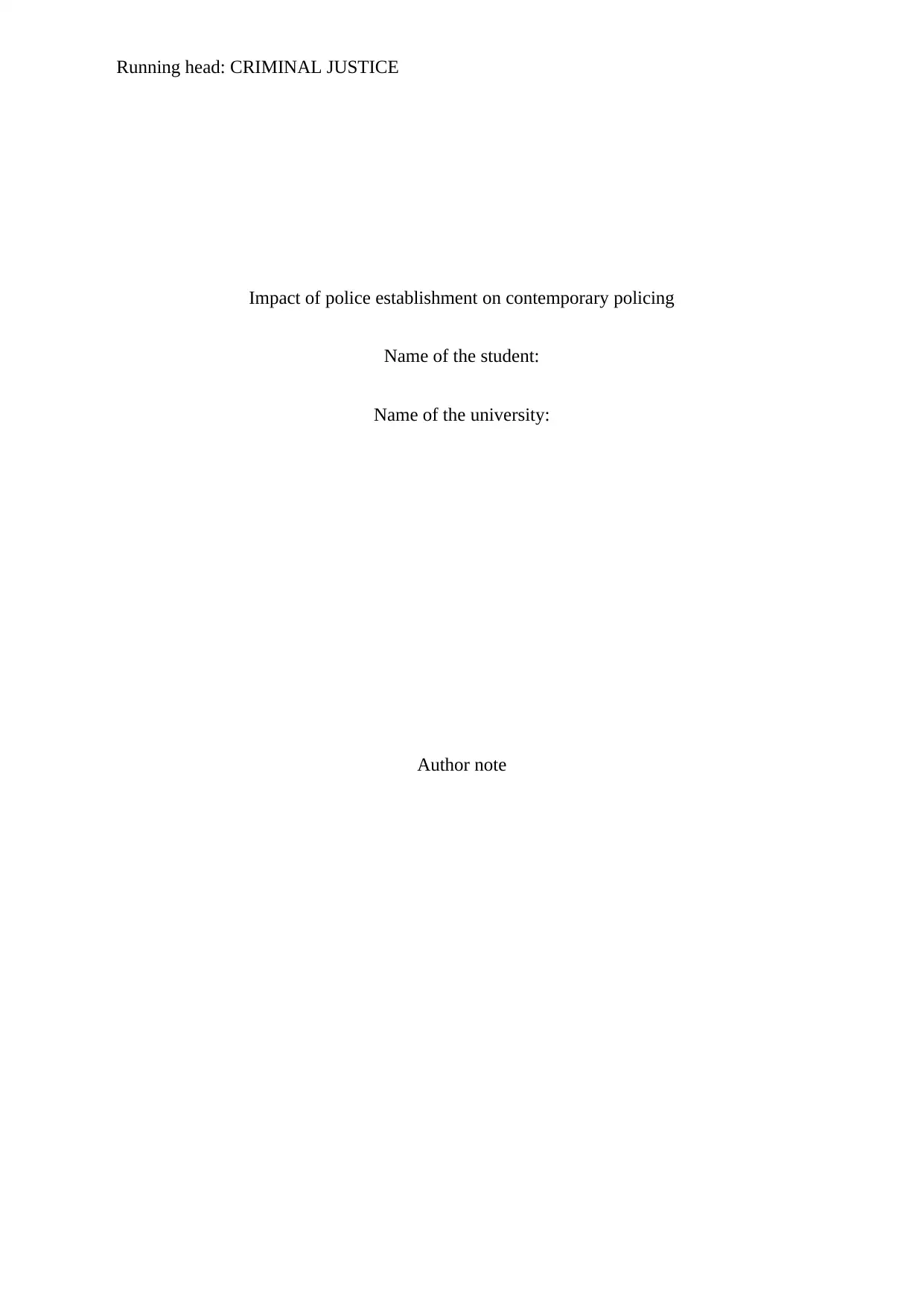
Running head: CRIMINAL JUSTICE
Impact of police establishment on contemporary policing
Name of the student:
Name of the university:
Author note
Impact of police establishment on contemporary policing
Name of the student:
Name of the university:
Author note
Secure Best Marks with AI Grader
Need help grading? Try our AI Grader for instant feedback on your assignments.
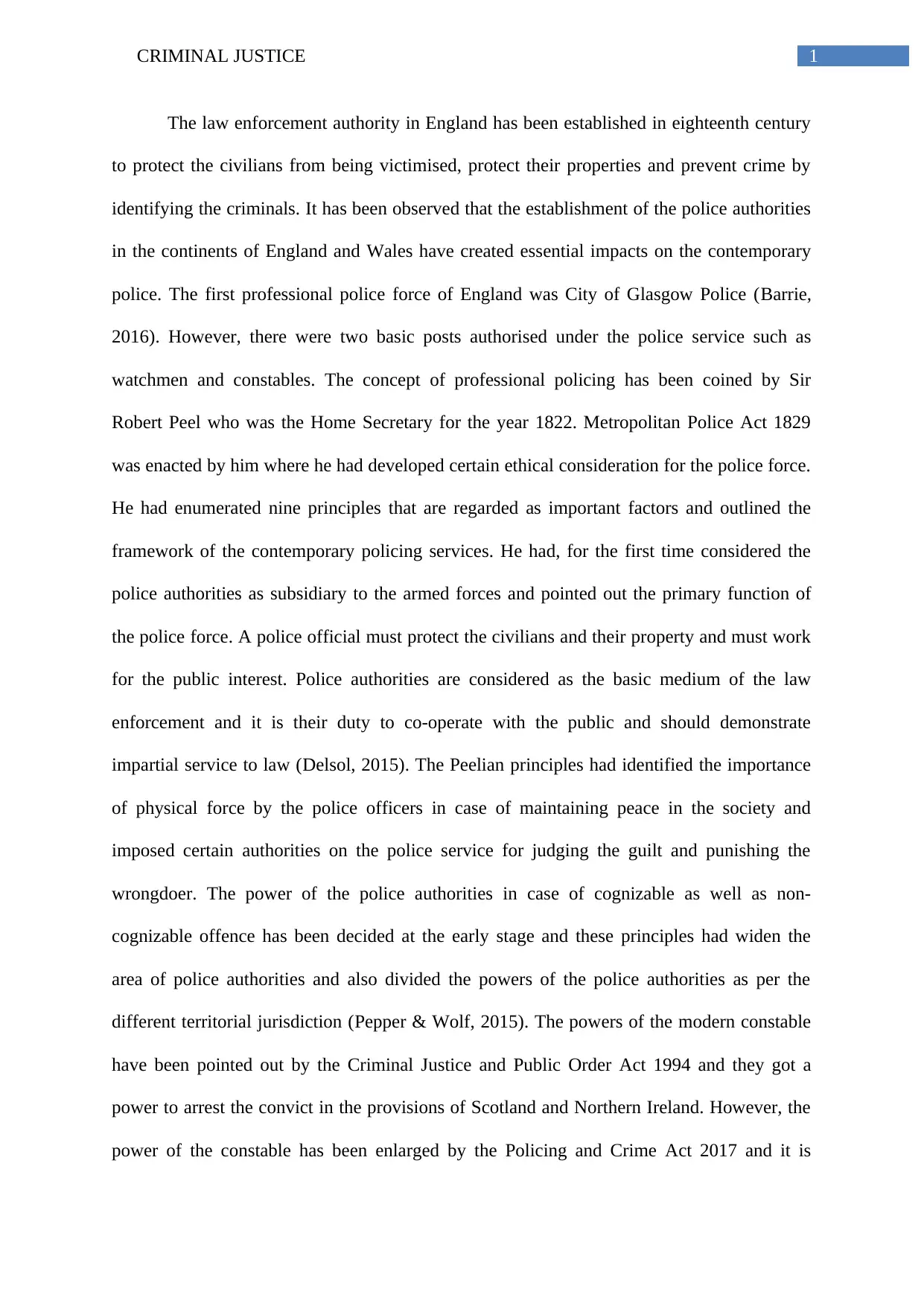
1CRIMINAL JUSTICE
The law enforcement authority in England has been established in eighteenth century
to protect the civilians from being victimised, protect their properties and prevent crime by
identifying the criminals. It has been observed that the establishment of the police authorities
in the continents of England and Wales have created essential impacts on the contemporary
police. The first professional police force of England was City of Glasgow Police (Barrie,
2016). However, there were two basic posts authorised under the police service such as
watchmen and constables. The concept of professional policing has been coined by Sir
Robert Peel who was the Home Secretary for the year 1822. Metropolitan Police Act 1829
was enacted by him where he had developed certain ethical consideration for the police force.
He had enumerated nine principles that are regarded as important factors and outlined the
framework of the contemporary policing services. He had, for the first time considered the
police authorities as subsidiary to the armed forces and pointed out the primary function of
the police force. A police official must protect the civilians and their property and must work
for the public interest. Police authorities are considered as the basic medium of the law
enforcement and it is their duty to co-operate with the public and should demonstrate
impartial service to law (Delsol, 2015). The Peelian principles had identified the importance
of physical force by the police officers in case of maintaining peace in the society and
imposed certain authorities on the police service for judging the guilt and punishing the
wrongdoer. The power of the police authorities in case of cognizable as well as non-
cognizable offence has been decided at the early stage and these principles had widen the
area of police authorities and also divided the powers of the police authorities as per the
different territorial jurisdiction (Pepper & Wolf, 2015). The powers of the modern constable
have been pointed out by the Criminal Justice and Public Order Act 1994 and they got a
power to arrest the convict in the provisions of Scotland and Northern Ireland. However, the
power of the constable has been enlarged by the Policing and Crime Act 2017 and it is
The law enforcement authority in England has been established in eighteenth century
to protect the civilians from being victimised, protect their properties and prevent crime by
identifying the criminals. It has been observed that the establishment of the police authorities
in the continents of England and Wales have created essential impacts on the contemporary
police. The first professional police force of England was City of Glasgow Police (Barrie,
2016). However, there were two basic posts authorised under the police service such as
watchmen and constables. The concept of professional policing has been coined by Sir
Robert Peel who was the Home Secretary for the year 1822. Metropolitan Police Act 1829
was enacted by him where he had developed certain ethical consideration for the police force.
He had enumerated nine principles that are regarded as important factors and outlined the
framework of the contemporary policing services. He had, for the first time considered the
police authorities as subsidiary to the armed forces and pointed out the primary function of
the police force. A police official must protect the civilians and their property and must work
for the public interest. Police authorities are considered as the basic medium of the law
enforcement and it is their duty to co-operate with the public and should demonstrate
impartial service to law (Delsol, 2015). The Peelian principles had identified the importance
of physical force by the police officers in case of maintaining peace in the society and
imposed certain authorities on the police service for judging the guilt and punishing the
wrongdoer. The power of the police authorities in case of cognizable as well as non-
cognizable offence has been decided at the early stage and these principles had widen the
area of police authorities and also divided the powers of the police authorities as per the
different territorial jurisdiction (Pepper & Wolf, 2015). The powers of the modern constable
have been pointed out by the Criminal Justice and Public Order Act 1994 and they got a
power to arrest the convict in the provisions of Scotland and Northern Ireland. However, the
power of the constable has been enlarged by the Policing and Crime Act 2017 and it is
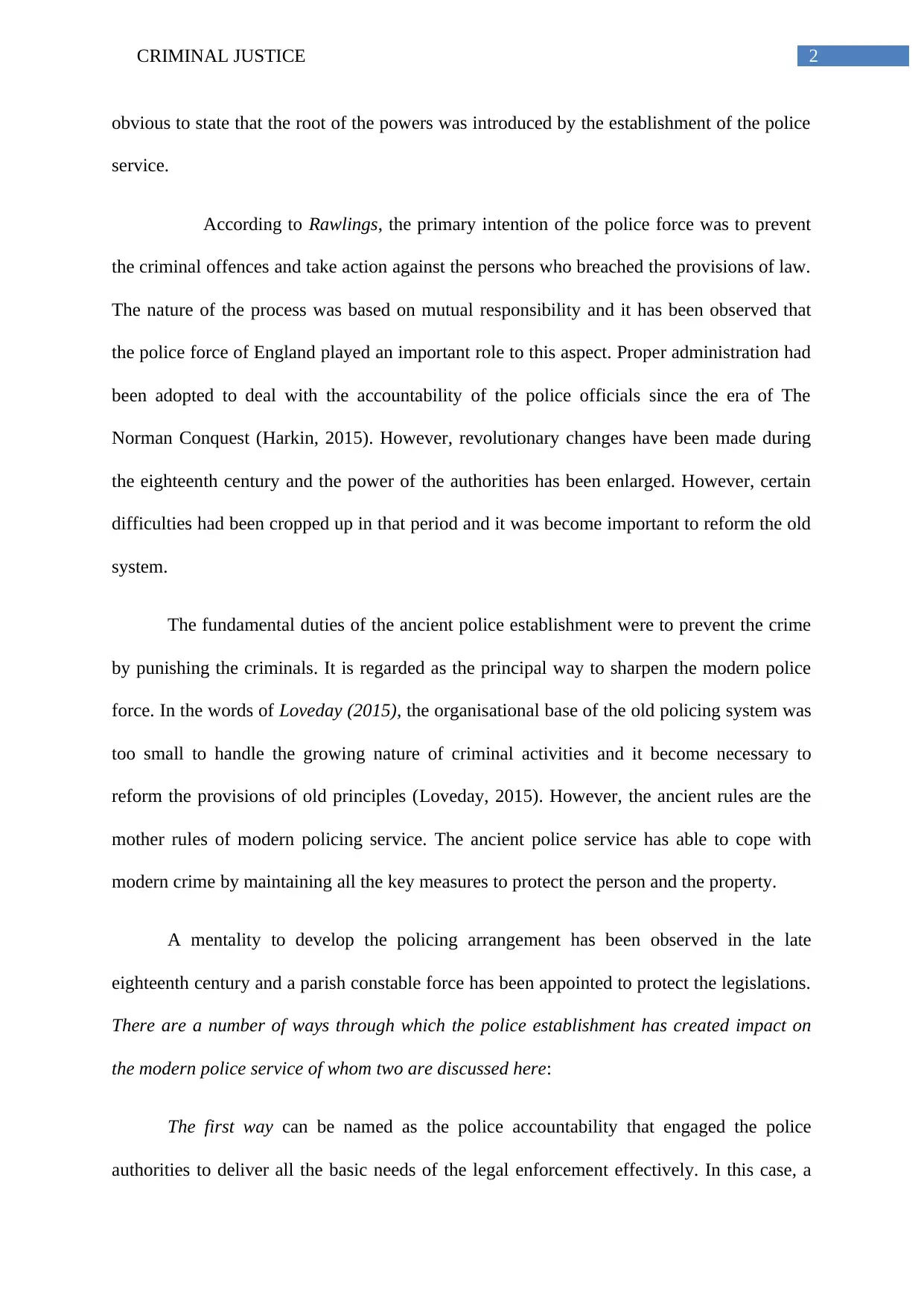
2CRIMINAL JUSTICE
obvious to state that the root of the powers was introduced by the establishment of the police
service.
According to Rawlings, the primary intention of the police force was to prevent
the criminal offences and take action against the persons who breached the provisions of law.
The nature of the process was based on mutual responsibility and it has been observed that
the police force of England played an important role to this aspect. Proper administration had
been adopted to deal with the accountability of the police officials since the era of The
Norman Conquest (Harkin, 2015). However, revolutionary changes have been made during
the eighteenth century and the power of the authorities has been enlarged. However, certain
difficulties had been cropped up in that period and it was become important to reform the old
system.
The fundamental duties of the ancient police establishment were to prevent the crime
by punishing the criminals. It is regarded as the principal way to sharpen the modern police
force. In the words of Loveday (2015), the organisational base of the old policing system was
too small to handle the growing nature of criminal activities and it become necessary to
reform the provisions of old principles (Loveday, 2015). However, the ancient rules are the
mother rules of modern policing service. The ancient police service has able to cope with
modern crime by maintaining all the key measures to protect the person and the property.
A mentality to develop the policing arrangement has been observed in the late
eighteenth century and a parish constable force has been appointed to protect the legislations.
There are a number of ways through which the police establishment has created impact on
the modern police service of whom two are discussed here:
The first way can be named as the police accountability that engaged the police
authorities to deliver all the basic needs of the legal enforcement effectively. In this case, a
obvious to state that the root of the powers was introduced by the establishment of the police
service.
According to Rawlings, the primary intention of the police force was to prevent
the criminal offences and take action against the persons who breached the provisions of law.
The nature of the process was based on mutual responsibility and it has been observed that
the police force of England played an important role to this aspect. Proper administration had
been adopted to deal with the accountability of the police officials since the era of The
Norman Conquest (Harkin, 2015). However, revolutionary changes have been made during
the eighteenth century and the power of the authorities has been enlarged. However, certain
difficulties had been cropped up in that period and it was become important to reform the old
system.
The fundamental duties of the ancient police establishment were to prevent the crime
by punishing the criminals. It is regarded as the principal way to sharpen the modern police
force. In the words of Loveday (2015), the organisational base of the old policing system was
too small to handle the growing nature of criminal activities and it become necessary to
reform the provisions of old principles (Loveday, 2015). However, the ancient rules are the
mother rules of modern policing service. The ancient police service has able to cope with
modern crime by maintaining all the key measures to protect the person and the property.
A mentality to develop the policing arrangement has been observed in the late
eighteenth century and a parish constable force has been appointed to protect the legislations.
There are a number of ways through which the police establishment has created impact on
the modern police service of whom two are discussed here:
The first way can be named as the police accountability that engaged the police
authorities to deliver all the basic needs of the legal enforcement effectively. In this case, a
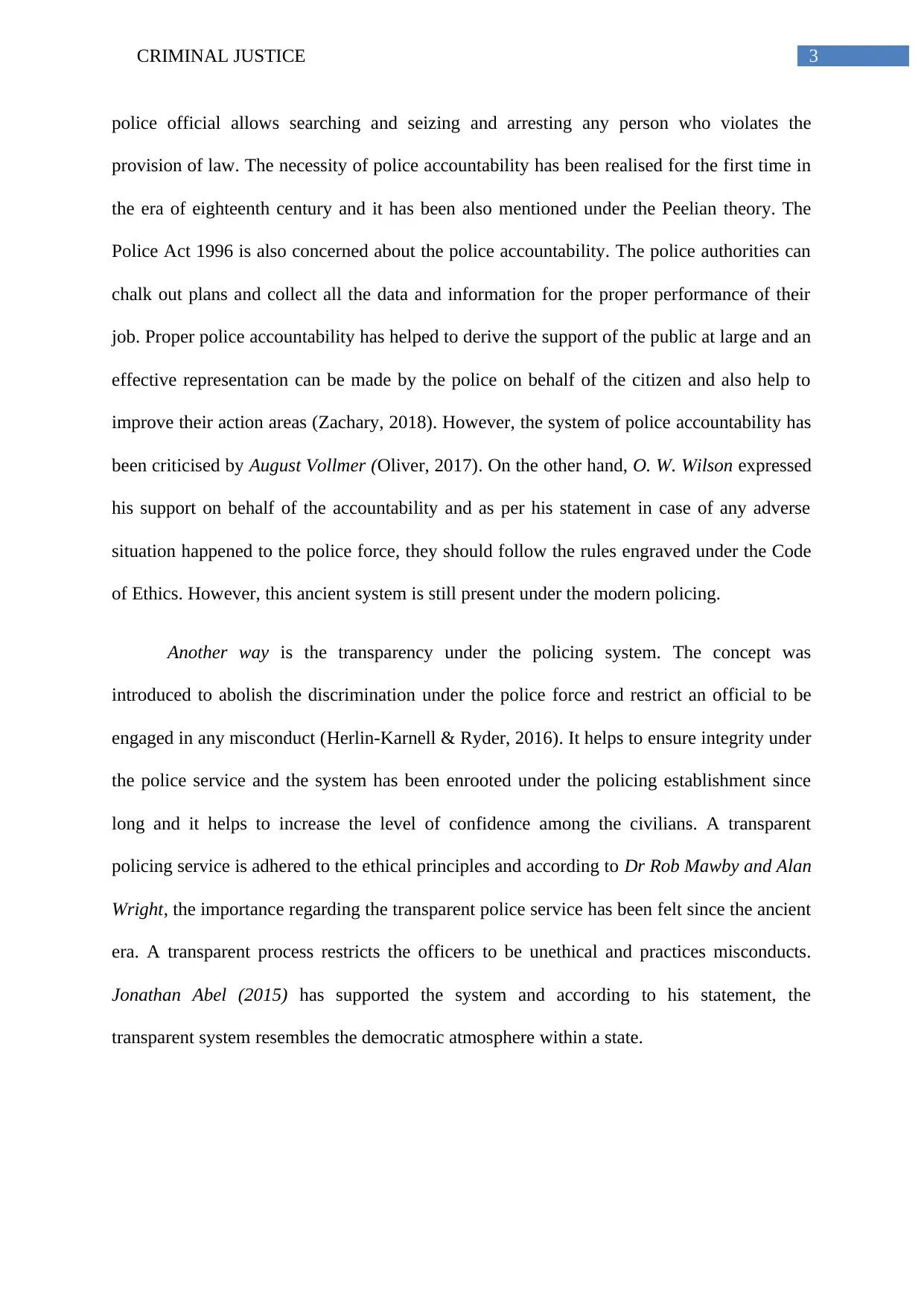
3CRIMINAL JUSTICE
police official allows searching and seizing and arresting any person who violates the
provision of law. The necessity of police accountability has been realised for the first time in
the era of eighteenth century and it has been also mentioned under the Peelian theory. The
Police Act 1996 is also concerned about the police accountability. The police authorities can
chalk out plans and collect all the data and information for the proper performance of their
job. Proper police accountability has helped to derive the support of the public at large and an
effective representation can be made by the police on behalf of the citizen and also help to
improve their action areas (Zachary, 2018). However, the system of police accountability has
been criticised by August Vollmer (Oliver, 2017). On the other hand, O. W. Wilson expressed
his support on behalf of the accountability and as per his statement in case of any adverse
situation happened to the police force, they should follow the rules engraved under the Code
of Ethics. However, this ancient system is still present under the modern policing.
Another way is the transparency under the policing system. The concept was
introduced to abolish the discrimination under the police force and restrict an official to be
engaged in any misconduct (Herlin-Karnell & Ryder, 2016). It helps to ensure integrity under
the police service and the system has been enrooted under the policing establishment since
long and it helps to increase the level of confidence among the civilians. A transparent
policing service is adhered to the ethical principles and according to Dr Rob Mawby and Alan
Wright, the importance regarding the transparent police service has been felt since the ancient
era. A transparent process restricts the officers to be unethical and practices misconducts.
Jonathan Abel (2015) has supported the system and according to his statement, the
transparent system resembles the democratic atmosphere within a state.
police official allows searching and seizing and arresting any person who violates the
provision of law. The necessity of police accountability has been realised for the first time in
the era of eighteenth century and it has been also mentioned under the Peelian theory. The
Police Act 1996 is also concerned about the police accountability. The police authorities can
chalk out plans and collect all the data and information for the proper performance of their
job. Proper police accountability has helped to derive the support of the public at large and an
effective representation can be made by the police on behalf of the citizen and also help to
improve their action areas (Zachary, 2018). However, the system of police accountability has
been criticised by August Vollmer (Oliver, 2017). On the other hand, O. W. Wilson expressed
his support on behalf of the accountability and as per his statement in case of any adverse
situation happened to the police force, they should follow the rules engraved under the Code
of Ethics. However, this ancient system is still present under the modern policing.
Another way is the transparency under the policing system. The concept was
introduced to abolish the discrimination under the police force and restrict an official to be
engaged in any misconduct (Herlin-Karnell & Ryder, 2016). It helps to ensure integrity under
the police service and the system has been enrooted under the policing establishment since
long and it helps to increase the level of confidence among the civilians. A transparent
policing service is adhered to the ethical principles and according to Dr Rob Mawby and Alan
Wright, the importance regarding the transparent police service has been felt since the ancient
era. A transparent process restricts the officers to be unethical and practices misconducts.
Jonathan Abel (2015) has supported the system and according to his statement, the
transparent system resembles the democratic atmosphere within a state.
Secure Best Marks with AI Grader
Need help grading? Try our AI Grader for instant feedback on your assignments.
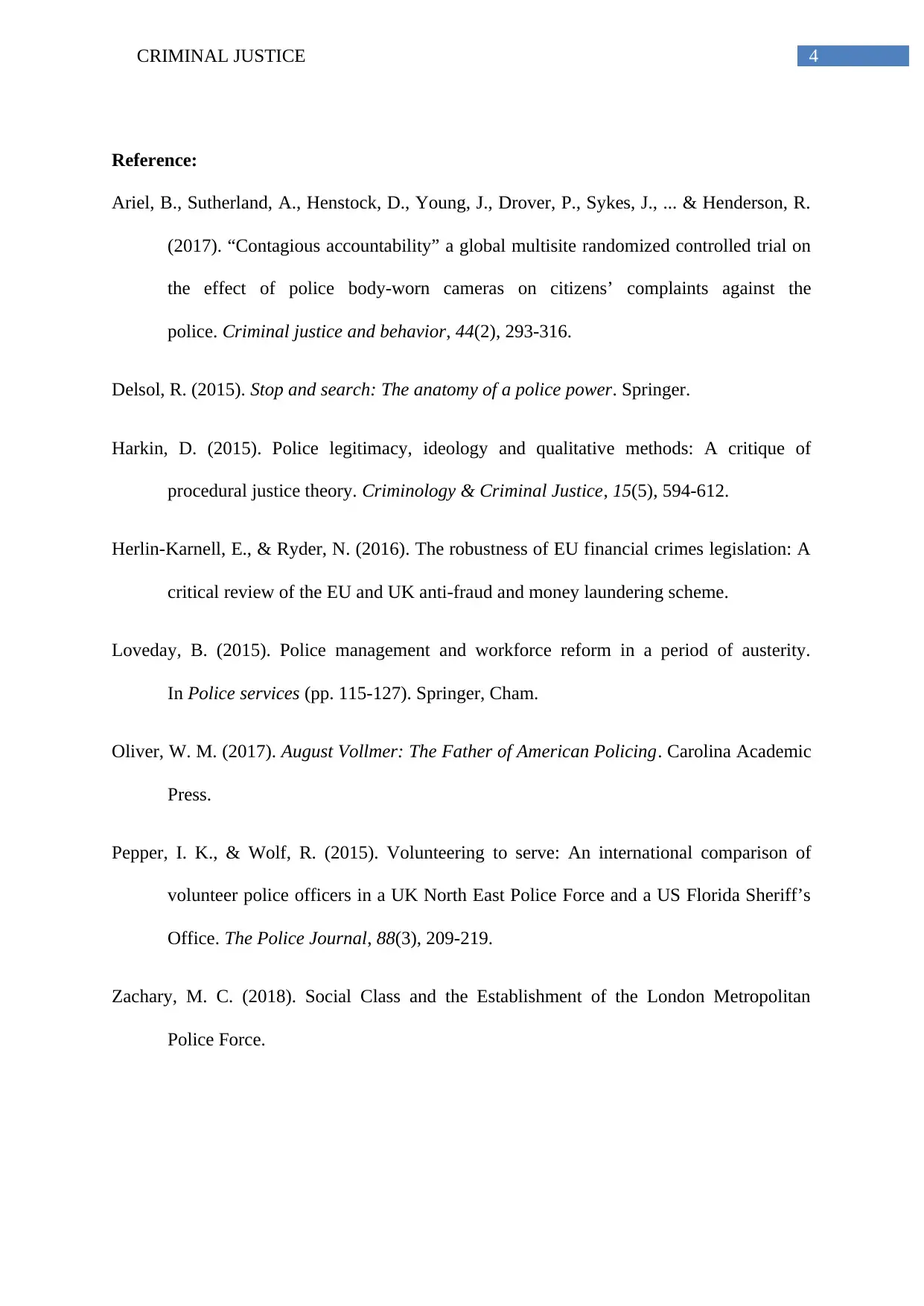
4CRIMINAL JUSTICE
Reference:
Ariel, B., Sutherland, A., Henstock, D., Young, J., Drover, P., Sykes, J., ... & Henderson, R.
(2017). “Contagious accountability” a global multisite randomized controlled trial on
the effect of police body-worn cameras on citizens’ complaints against the
police. Criminal justice and behavior, 44(2), 293-316.
Delsol, R. (2015). Stop and search: The anatomy of a police power. Springer.
Harkin, D. (2015). Police legitimacy, ideology and qualitative methods: A critique of
procedural justice theory. Criminology & Criminal Justice, 15(5), 594-612.
Herlin-Karnell, E., & Ryder, N. (2016). The robustness of EU financial crimes legislation: A
critical review of the EU and UK anti-fraud and money laundering scheme.
Loveday, B. (2015). Police management and workforce reform in a period of austerity.
In Police services (pp. 115-127). Springer, Cham.
Oliver, W. M. (2017). August Vollmer: The Father of American Policing. Carolina Academic
Press.
Pepper, I. K., & Wolf, R. (2015). Volunteering to serve: An international comparison of
volunteer police officers in a UK North East Police Force and a US Florida Sheriff’s
Office. The Police Journal, 88(3), 209-219.
Zachary, M. C. (2018). Social Class and the Establishment of the London Metropolitan
Police Force.
Reference:
Ariel, B., Sutherland, A., Henstock, D., Young, J., Drover, P., Sykes, J., ... & Henderson, R.
(2017). “Contagious accountability” a global multisite randomized controlled trial on
the effect of police body-worn cameras on citizens’ complaints against the
police. Criminal justice and behavior, 44(2), 293-316.
Delsol, R. (2015). Stop and search: The anatomy of a police power. Springer.
Harkin, D. (2015). Police legitimacy, ideology and qualitative methods: A critique of
procedural justice theory. Criminology & Criminal Justice, 15(5), 594-612.
Herlin-Karnell, E., & Ryder, N. (2016). The robustness of EU financial crimes legislation: A
critical review of the EU and UK anti-fraud and money laundering scheme.
Loveday, B. (2015). Police management and workforce reform in a period of austerity.
In Police services (pp. 115-127). Springer, Cham.
Oliver, W. M. (2017). August Vollmer: The Father of American Policing. Carolina Academic
Press.
Pepper, I. K., & Wolf, R. (2015). Volunteering to serve: An international comparison of
volunteer police officers in a UK North East Police Force and a US Florida Sheriff’s
Office. The Police Journal, 88(3), 209-219.
Zachary, M. C. (2018). Social Class and the Establishment of the London Metropolitan
Police Force.
1 out of 5
Related Documents
Your All-in-One AI-Powered Toolkit for Academic Success.
+13062052269
info@desklib.com
Available 24*7 on WhatsApp / Email
![[object Object]](/_next/static/media/star-bottom.7253800d.svg)
Unlock your academic potential
© 2024 | Zucol Services PVT LTD | All rights reserved.





